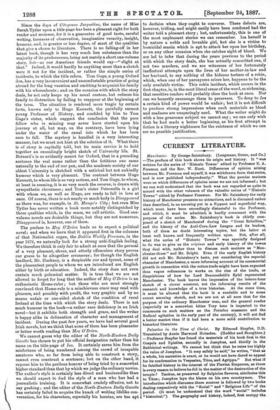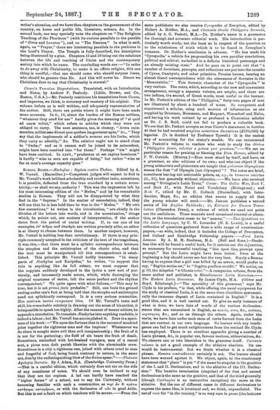Palestine in the Time of Christ. By Edmond Stapler, D.D.
Translated by Annie Harwood Holmden. (Hodder and Stoughton.) —Professor Stapler has found the materials of his book first in the Gospels and Epistles, secondly is Josephus, and thirdly in the Rabbinical writings. We cannot but think that he rates too highly the value of Josephus. "It may safely be said," he writes, "that as a whole, his narrative is exact, or he would not have dared to appeal for its confirmation to Vespasian, Titus, and Agrippa." But what if he falsified history in the interest of the Florian Emperors, as there is every reason to believe he did in the matter of the destruction of the temple P Taoitus, as preserved by Salpicias Severna, attributes this to Titus ; Joseplans lays the blame on his own countrymen. The introduction which discusses these ;sources is followed by two books dealing respectively with the " Social " and "Religions Life" of the period. (It most be understood that the word "social" includes "historical.") The geography and history, indeed, first occupy the
writer's attention, and we have then chapters on the government of the country, on home and public life, literature, science, he. In the second book, one may specially note the chapters on " The Religious Teaching of the Pharisees" (with its curious parallels to the parable of "Dives and Lazarus "), and on "The Essence." In what is said, again, on "Prayer," there are interesting parallels to the petitions in the Lord's Prayer. The Temple is fully described, the description being illustrated by a plan. Chapters 15 and 16 bring out the relations between the life and teaching of Christ and the contemporary society into which he came. The concluding words are :—" In order to do away with Christianity, to make it an effete religion, this one thing is needfnl,—that one should come who should surpass Jesus, who aboteld be greater than He. And this will never be. Hence we Christians dare to say that Christianity is eternal."



































 Previous page
Previous page